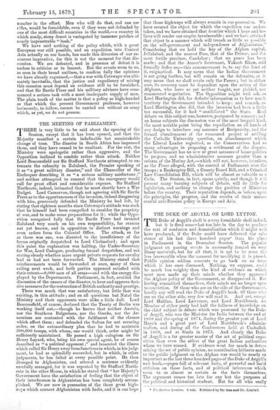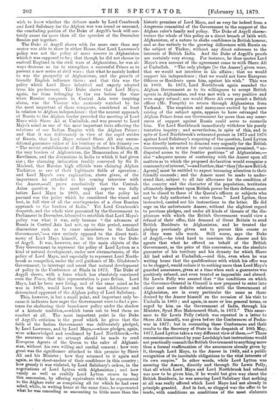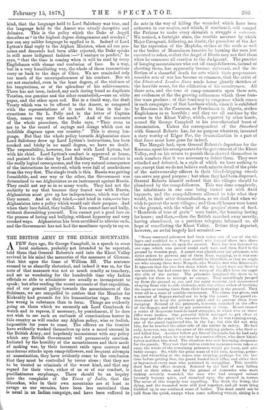THE DUKE OF ARGYLL ON LORD LYTTON.
THE Duke of Argyll's shell is a very formidable shell indeed, but it is fired somewhat too late in the day to produe the sort of confusion and demoralisation which it might well have produced, if the Duke could have delivered the sub- stance of his last three hundred pages* from his plac.?
in Parliament in the December Session. The popular judgment on passing events is necessarily framed on very flimsy materials, but for all that, it is apt to be none the less irrevocable when the moment for modifying it is passed. Public opinion seldom consents to go back on an issue which it has once discussed. Nothing, we suppose, could be much less weighty than the kind of evidence on which most men made up their minds whether they approved the Afghan policy of the Government, or disapproved it. But having committed themselves, their minds are no longer open to conviction. Of those who are on the side of the Government, hardly any will read the Duke of Argyll's book. Of those who are on the other side, very few will read it. And yet, except Lord Halifax, Lord Lawrence, and Lord Northbrook, no Member of either party had half the fullness of knowledge on the chief subject in debate which was possessed by the Duke of Argyll, who was the Minister far India between the end of 1868 and the spring of 1874, during the greater part of Lord Mayo's and a great part of Lord Northbrook's adminis- tration, and during all the Conferences held at Umballah in 1869, and at Simla in 1873. And clearly the Duke of Argyll is a far greater master of the art of political expo- sition than even the ablest of the great Indian authorities whom we have named. If evidence went for much in deter- mining the set of public opinion, no contribution hitherto made to the public judgment on the Afghan war would be nearly so important as the last three hundred pages of the.Duke of Argyll's new book,—pages full of relevant facts, of powerful and lucid criticism on those facts, and of political inferences which seem to us almost as certain as the facts themselves. The argument comes too late for any but the purposes of the political and historical student. But for all who really
' Pie Eas'ern Question. 2 vols. Published by Straiten and Co., Limited.
wish to know whether the defence made by Lord Cranbrook and Lord Salisbury for the Afghan war was sound or unsound, the concluding portion of the Duke of Argyll's book will cer- tainly count for more than all the speeches of the December Session put together.
The Duke of Argyll shows with far more care than any orator was able to show in either House, that Lord Lawrence's policy was not the policy of mere reserve in Afghanistan which it was supposed to be ; that though he did not choose to embroil England in the civil wars of Afghanistan, he was al- ways desirous so far to strengthen a successful Prince as to prevent a new series of civil wars ; that what he mainly looked to was the prosperity of Afghanistan, and the growth of friendly English influence there ; and that this was the policy which Lord Mayo inherited and eagerly adopted from his predecessor. The Duke shows that Lord Mayo, again, far from belonging to the era before the time when Russian conquests in Central Asia were inspiring alarm, was the Viceroy who anxiously watched by far the most important of these conquests, considered at least in relation to Afghan independence ; that the nearest approach of Russia to the Afghan border preceded the meeting of Lord Mayo with Shere Ali at Umballah, and was present to Lord Mayo's mind as one of the most important facts affecting the relations of our Indian Empire with the Afghan Prince ; and that it was deliberately in view of the rapid strides of Russia, that Lord Mayo refused Shere Ali any uncon- ditional guarantee either of his territory or of his dynasty :- " The recent establishment of Russian influence in Bokhara, on the very borders of Afghanistan, the Memorandum of Sir H. Rawlinson, and the discussions in India to which it had given rise ; the alarming intimation freshly conveyed by Sir D. Macleod, that Russian high officials were claiming Afghan Turkistan as one of their legitimate fields of operation ; and Lord Mayo's own explanation, above given, of the importance he attached to his coming interview with the Ameer,—all prove conclusively that the Central- Asian question in its most urgent aspects was fully before Lord Mayo in 1869, and that the policy he pursued was the policy which he considered the wisest and best, in full view of all the contingencies of a close Russian approach to the borders of India." Yet Lord Cranbrook's despatch, and the whole view presented by the Government to Parliament in December, laboured to establish that Lord Mayo's policy was what it was, only because " the advances of Russia in Central Asia had not, up to this period, assumed dimensions such as to cause uneasiness to the Indian Government,"—a view entirely opposed to the direct testi- mony of Lord Mayo himself, in his letters to the Duke of Argyll. It was, however, one of the main objects of the Tory Government to represent the policy of Lord Lytton as a kind of natural development, under new circumstances, of the policy of Lord Mayo, and especially to represent Lord North- brook as compelled, under the evil guidance of Mr. Gladstone's Government, to interrupt and arrest that natural development of policy in the Conference at Simla in 1873. The Duke of Argyll shows, with a force which has absolutely convinced even the Times, that this representation is pure fiction. Lord Mayo, bad he been now living, and of the same mind as he was in 1869, would have been the most deliberate and determined opponent of the Afghan policy of Lord Salisbury.
This, however, is but a small point, and important only be- cause it indicates how eager the Government were to find a pre- tence for sheltering their brand-new policy under the shadow of a historic tradition,—which turns out to lend them no comfort at all. The most important point in the Duke of Argyll's criticism is the proof which he gives that the faith of the Indian Government was deliberately pledged, by Lord Lawrence, and by Lord Mayo,—whose pledges, again, were acknowledged and confirmed by Lord Northbrook,--Ito the assurance that no attempt should be made to send European Agents of the Queen to the ruler of Afghani- stan, without his own willing and cordial consent ; how very great was the significance attached to this promise by Shere Ali and his Minister ; how they returned to it again and again, as the sheet-anchor of their confidence in this country ; how grossly it was violated, by Lord Salisbury's orders, in the negotiations of Lord Lytton with Afghanistan ; and how vainly as well as craftily Lord Lytton strove to buy this concession, by offering equivalents which he represented to the Afghan ruler as comprising all for which he had ever asked, while, in writing home at the same time, he represented what lie was conceding as amounting to little more than the historic promises of Lord Mayo, and as very far indeed from a dangerous committal of the Government to the support of the Afghan ruler's family and policy. The Duke of Argyll charac- terises the whole of this policy as a direct breach of faith with Afghanistan, of a nature to shake confidence in British honour, and as due entirely to the growing differences with Russia on the subject of Turkey, without any direct reference to the interests of British India. And the Duke of Argyll's proofs are certainly very strong. For instance, he thus quotes Lord Mayo's own account of the agreement come to with Shere Ali at Umballah. " The only pledges [to the Ameer] given were, that we would not interfere in his affairs ; that we would support his independence ; that we would not force European Officers or Residents upon him, against his wish." This was in 1869. In 1873, Lord Northbrook again sounded the Afghan Government as to its willingness to accept British agents in Afghanistan, and was met with a very positive and even angry refusal ; nor would Shere Ali even permit a British officer (Mr. Forsyth) to return through Afghanistan from Yarkand. The suspicion and annoyance excited by the mere raising of the subject again, appears to have estranged the Afghan Prince from our Government far more than any assur- ances of support against Russia could serve to reconcile him. Yet Lord Northbrook immediately withdrew his purely tentative inquiry ; and nevertheless, in spite of this, and in spite of Lord Northbrook's reiterated protest in 1875 and 1876 against Lord Salisbury's reopening of the question, Lord Lytton was directly instructed to demand very urgently for the British Government, in return for certain concessions promised, " un- disputed access to the frontier positions " of Afghanistan,— also "adequate means of conferring with the Ameer upon all matters as to which the proposed declaration would recognise a community of interest,"—and further, that " they [the newBritish Agents] must be entitled to expect becoming attention to their friendly counsels ; and the Ameer must be made to under- stand that, subject to all fair allowance for the condition of the country and the character of the population, territories ultimately dependent upon British power for their defence, must not be closed to those of the Queen's officers or subjects who may be duly authorised to enter them." Lord Lytton, thus instructed, carried out his instructions to the letter. He did urge on the unfortunate Ameer, without the slightest regard to previous pledges, and under all kinds of threats of the dis- pleasure with which the British Government would view a refusal of their offer, this demand of Great Britain to send British Residents to Afghanistan, and he treated the pledges previously given not to pursue this course as
if they were idle words. Still worse, says the Duke of Argyll,—he tried hard to convince the Ameer and his agents that what he offered on behalf of the British Government, as the price of this concession, was the absolute guarantee of his territory and his dynasty for which Shere Ali had asked at Umballah,—and this, even when he was writing home that the qualifications with which his offer was to be clogged, would reduce it to nothing more than Lord Mayo's guarded assurances, given at a time when such a guarantee was positively refused, and even treated as impossible and absurd. Sir Lewis Pelly was snared that " the conditions on which the Governor-General in Council is now prepared to enter into closer and more definite relations with the Government of Afghanistan, are in every particular the same as those desired by the Ameer himself on the occasion of his visit to Umballa in 1869 ; and again, in more or less general terms, so urged by him on the Government of India, through his Minister, Syud Noo Mahommed Shah, in 1873." This assur- ance to Sir Lewis Pelly (which was repeated in a letter to Shere Ali himself), was given before the Conferences of Pesha- wur in 1877; but in recounting these Conferences and their results to the Secretary of State in the despatch of 10th May, I 877,Lord Lytton takes a very different view of them,—" These concessions sanctioned by your Lordship's last instructions would not practically commit the British Government to anything more than a formal reaffirmation of the assurances already given by it, through Lord Mayo, to the Ameer in 1869, and a public recognition of its inevitable obligations to the vital interests of its own empire." In other words, while Lord Lytton was assuring the Ameer, directly and through Sir Lewis Pelly, that all which Lord Mayo and Lord Northbrook had refused was now to be given him, if he would but give way about the British Residents, he was assuring Lord Salisbury that nothing at all was really offered which Lord Mayo had not already in principle granted. And in fact, so clogged was the offer to be made, with conditions on conditions of the most elaborate
kind, that the language held to Lord Salisbury was true, and the language held to the Ameer was utterly deceptive and delusive. This is the policy which the Duke of Argyll describes as " in.the highest degree disingenuous and crooked ;" nor can any milder language be applied to it. Indeed of Lord Lytton's final reply to the Afghan Minister, when all our pro- mises and demands had been alike rejected, the Duke speaks in still more indignant fashion :—" I venture to predict," he says, " that the time is coming when it will be read by every Englishman with shame and confusion of face. In a way, but in a very humiliating way, the whole of these transactions carry us back to the days of Clive. We are reminded only too much of the unscrupulousness of his conduct. But we are not reminded, even in the least degree, of the violence of his temptations, or of the splendour of his achievements. There has not been, indeed, any such daring fraud as duplicate Treaties, one genuine and the other counterfeit,—one on white paper, and the other upon red. But in a timid way, the draft Treaty which was to be offered to the Ameer, as compared with the representations of it made to him in the in- structions to Sir L. Pelly and in the letter of Captain Grey, comes very near the mark." And of the accounts of the whole procedure, the Duke says, " They seem to me to be the record of sayings and doings which cast an indelible disgrace upon our country." This is strong lan- guage. But that the whole policy towards Afghanistan since Lord Salisbury drew up Lord Lytton's instructions, has been crooked and tricky in no small degree, we have no doubt. The responsibility, however, lies not with Lord Lytton, but with his chief. Lord Lytton's conduct is approved at home, and praised to the skies by Lord Salisbury. That conduct is the really logical consequence, and the very natural consequence of the instructions he received, which were full of crookedness from the very first. The simple truth is this. Russia was getting formidable, and one way or the other, the Government was determined to use Afghanistan as an instrument against Russia. They could not say so in so many words. They had not the audacity to say that because they feared war with Russia, Afghanistan must give up her independence, which was what they meant. And so they tried,—and tried in vain,—to lure Afghanistan into a policy which would suit their purpose. And when their lure failed, they bullied. You cannot lure and bully, without discrediting yourself. You cannot put a good face on the process of luring and bullying, without hypocrisy and very crooked ways. Afghanistan has been sacrificed to ulterior ends, and the Government has not had the manliness openly to say so.




































 Previous page
Previous page